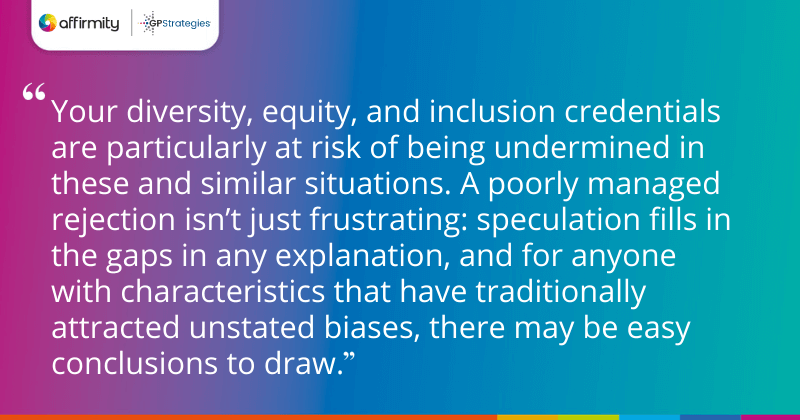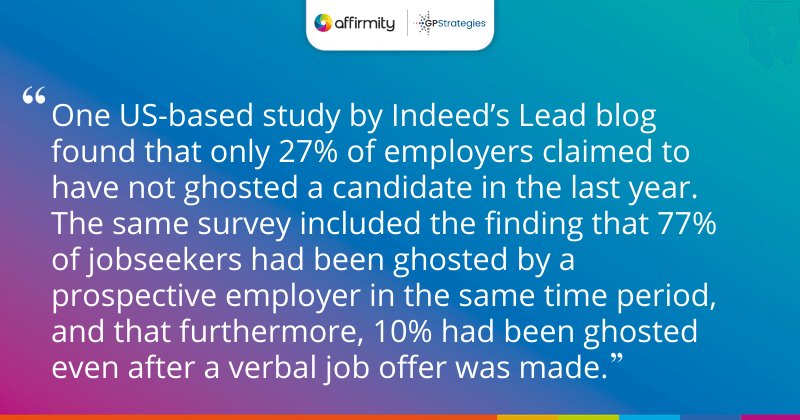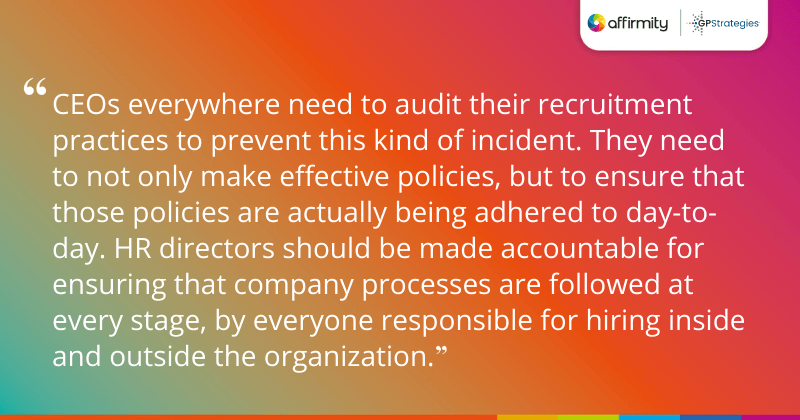The days of a buyer’s market in recruitment are behind us, and the bad habits many organizations formed around rejection are rightly backfiring. It was never right to keep job seekers in the dark about their applications, but a tighter labor market and an uncertain economy mean only one thing. In this article, Angie Peacock, Director of Global Diversity and Inclusion at GP Strategies (an Affirmity inclusion training partner) takes a closer look at why, if you “ghost” candidates, it will come back to haunt you.
It’s easy to fall into the trap of viewing a recruitment process as necessary but insulated from the “real” work of your organization. However, it’s a process that inevitably creates advocates and detractors for your brand. Saying “yes” to the right candidate means you’ll also be saying “no” to many others, and how you communicate a rejection can be just as important as how you issue an acceptance.
Why then, do so many businesses elect to avoid communicating a rejection at all?
It’s not difficult to imagine scenarios where a mismanaged rejection could undermine your business. For example, today’s dismissed candidates could be tomorrow’s key decision-makers, something you won’t realize until your organization pitches for lucrative contracts many years down the road.
Your diversity, equity, and inclusion credentials are particularly at risk of being undermined in these and similar situations. A poorly managed rejection isn’t just frustrating: speculation fills in the gaps in any explanation, and for anyone with characteristics that have traditionally attracted unstated biases, there may be easy conclusions to draw.
HAND-PICKED FOR YOU | ‘An Introduction to the 4 Key Strategies Every DE&I Program Needs’

A Spectre Hanging Over Candidates and Organizations Alike
Bad experiences travel further than they used to. It’s no longer unusual for organizations to be named and shamed online, and candidates are less afraid of being seen as a troublemaker if they have a poor interaction with your recruitment teams. Meanwhile, as organizations place continuously greater emphasis on environmental, social, and governance (ESG) values (and DE&I within that), potential clients, partners, and even individual candidates are doing due diligence to see just how true those claims are. If a quick search turns up a flurry of social media posts from ghosted or otherwise disgruntled candidates, those claims will ring hollow.
Candidates are, of course, not above failing to return calls or ignoring job offers. There are usually repercussions—they’ll lose the current offer and recruitment agencies may drop them altogether, for example. However, this form of ghosting lacks the same level of potential for psychological damage that the reverse threatens. Anyone who has ever experienced the imposter phenomenon will tell you that applying for work is particularly challenging—being ghosted by a job you’re fully qualified for tends to confirm all your most unfair fears about your own capabilities.
RELEVANT READING | ‘5 Ways Organizations Can Reduce the Impact of the Imposter Phenomenon’

One US-based study by Indeed’s Lead blog found that only 27% of employers claimed to have not ghosted a candidate in the last year. The same survey included the finding that 77% of jobseekers had been ghosted by a prospective employer in the same time period, and that furthermore, 10% had been ghosted even after a verbal job offer was made.
The more widespread ghosting of candidates becomes, the greater a mental health risk it poses for business and society at large. If a single, appropriately qualified candidate fails to receive any reply whatsoever from seven separate recruitment processes, how is that going to feel? Unfortunately, we’re well on the way to this being a widespread phenomenon and one that isn’t limited to just junior applicants. The GP Strategies team are aware of multiple senior executives being ghosted by organizations who claim to hold DE&I values that clearly aren’t evidenced in their recruitment processes.
Ghosting looks particularly bad when organizations cease contact after protracted recruitment processes. Anecdotally, we’re also aware of one applicant who was ghosted after an organization interviewed them nine times, set an assessment, conducted three psychometric tests, and had them deliver a presentation on the organization’s HR strategy. After a week of silence, this candidate chased the recruiter via email and phone. When they escalated this poor treatment to the organization’s CEO, they didn’t receive a reply.
MORE FROM THE BLOG | ‘4 Important Actions That Will Strengthen Your Affirmative Action Plan Narratives’

How to Start Driving Out Bad Recruitment Practices
CEOs everywhere need to audit their recruitment practices to prevent this kind of incident. They need to not only make effective policies, but to ensure that those policies are actually being adhered to day-to-day. There are some simple steps business leaders can take in this direction. HR directors should be made accountable for ensuring that company processes are followed at every stage, by everyone responsible for hiring inside and outside the organization.
They should be actively checking, for example, that basic rejection letters are being sent to candidates at first interview at the very least. Candidates who make it further along the hiring process should receive more detail—a feedback note should be standard. Your policy must extend to recruiters, and their compliance with the process should be checked with the same vigor as those of internal teams.
When hiring activity gets intense, ghosting candidates should never be an option on the table. Yes, it’s frustrating when your search for the perfect candidate fails and you have to redouble your efforts—but being willing and able to articulate to candidates why they aren’t right for the position is proof positive of your ability to hire properly and fairly.
If you would like to discuss how to create a more diverse, inclusive, and equitable organization, please contact us today.
A version of this article originally appeared on Consultancy UK.
 About the Author
About the Author
Angela Peacock is the Global Director of Diversity and Inclusion at GP Strategies. Through the work of hundreds of clients across 20 years of global DE&I experience, Angela has seen the good, the bad, and the downright idiotic: she pulls no punches and has learned that by having frank, strategic, and not just well-meaning conversations, organizations can drive better results and excel in terms of diversity, inclusion, and business performance.
